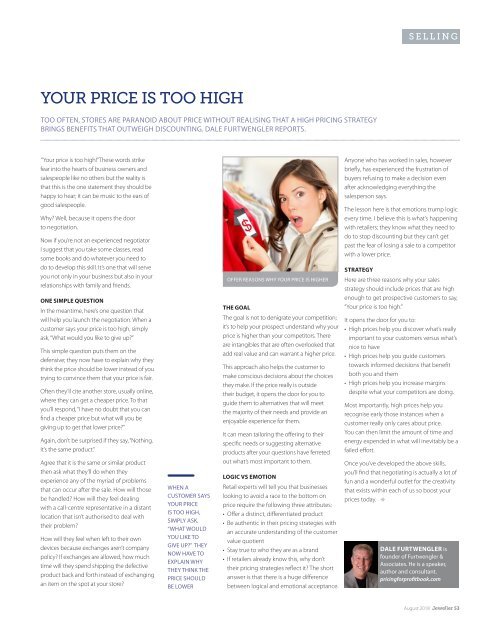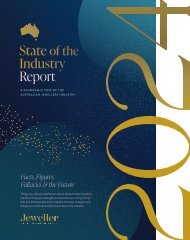You also want an ePaper? Increase the reach of your titles
YUMPU automatically turns print PDFs into web optimized ePapers that Google loves.
SELLING<br />
YOUR PRICE IS TOO HIGH<br />
TOO OFTEN, STORES ARE PARANOID ABOUT PRICE WITHOUT REALISING THAT A HIGH PRICING STRATEGY<br />
BRINGS BENEFITS THAT OUTWEIGH DISCOUNTING. DALE FURTWENGLER REPORTS.<br />
“Your price is too high!” These words strike<br />
fear into the hearts of business owners and<br />
salespeople like no others but the reality is<br />
that this is the one statement they should be<br />
happy to hear; it can be music to the ears of<br />
good salespeople.<br />
Why? Well, because it opens the door<br />
to negotiation.<br />
Now if you’re not an experienced negotiator<br />
I suggest that you take some classes, read<br />
some books and do whatever you need to<br />
do to develop this skill. It’s one that will serve<br />
you not only in your business but also in your<br />
relationships with family and friends.<br />
ONE SIMPLE QUESTION<br />
In the meantime, here’s one question that<br />
will help you launch the negotiation. When a<br />
customer says your price is too high, simply<br />
ask, “What would you like to give up?”<br />
This simple question puts them on the<br />
defensive; they now have to explain why they<br />
think the price should be lower instead of you<br />
trying to convince them that your price is fair.<br />
Often they’ll cite another store, usually online,<br />
where they can get a cheaper price. To that<br />
you’ll respond, “I have no doubt that you can<br />
find a cheaper price but what will you be<br />
giving up to get that lower price?”<br />
Again, don’t be surprised if they say, “Nothing.<br />
It’s the same product.”<br />
Agree that it is the same or similar product<br />
then ask what they’ll do when they<br />
experience any of the myriad of problems<br />
that can occur after the sale. How will those<br />
be handled? How will they feel dealing<br />
with a call-centre representative in a distant<br />
location that isn’t authorised to deal with<br />
their problem?<br />
How will they feel when left to their own<br />
devices because exchanges aren’t company<br />
policy? If exchanges are allowed, how much<br />
time will they spend shipping the defective<br />
product back and forth instead of exchanging<br />
an item on the spot at your store?<br />
WHEN A<br />
CUSTOMER SAYS<br />
YOUR PRICE<br />
IS TOO HIGH,<br />
SIMPLY ASK,<br />
“WHAT WOULD<br />
YOU LIKE TO<br />
GIVE UP?” THEY<br />
NOW HAVE TO<br />
EXPLAIN WHY<br />
THEY THINK THE<br />
PRICE SHOULD<br />
BE LOWER<br />
OFFER REASONS WHY YOUR PRICE IS HIGHER<br />
THE GOAL<br />
The goal is not to denigrate your competition;<br />
it’s to help your prospect understand why your<br />
price is higher than your competitors. There<br />
are intangibles that are often overlooked that<br />
add real value and can warrant a higher price.<br />
This approach also helps the customer to<br />
make conscious decisions about the choices<br />
they make. If the price really is outside<br />
their budget, it opens the door for you to<br />
guide them to alternatives that will meet<br />
the majority of their needs and provide an<br />
enjoyable experience for them.<br />
It can mean tailoring the offering to their<br />
specific needs or suggesting alternative<br />
products after your questions have ferreted<br />
out what’s most important to them.<br />
LOGIC VS EMOTION<br />
Retail experts will tell you that businesses<br />
looking to avoid a race to the bottom on<br />
price require the following three attributes:<br />
• Offer a distinct, differentiated product<br />
• Be authentic in their pricing strategies with<br />
an accurate understanding of the customer<br />
value quotient<br />
• Stay true to who they are as a brand<br />
• If retailers already know this, why don’t<br />
their pricing strategies reflect it? The short<br />
answer is that there is a huge difference<br />
between logical and emotional acceptance.<br />
Anyone who has worked in sales, however<br />
briefly, has experienced the frustration of<br />
buyers refusing to make a decision even<br />
after acknowledging everything the<br />
salesperson says.<br />
The lesson here is that emotions trump logic<br />
every time. I believe this is what’s happening<br />
with retailers; they know what they need to<br />
do to stop discounting but they can’t get<br />
past the fear of losing a sale to a competitor<br />
with a lower price.<br />
STRATEGY<br />
Here are three reasons why your sales<br />
strategy should include prices that are high<br />
enough to get prospective customers to say,<br />
“Your price is too high.”<br />
It opens the door for you to:<br />
• High prices help you discover what’s really<br />
important to your customers versus what’s<br />
nice to have<br />
• High prices help you guide customers<br />
towards informed decisions that benefit<br />
both you and them<br />
• High prices help you increase margins<br />
despite what your competitors are doing.<br />
Most importantly, high prices help you<br />
recognise early those instances when a<br />
customer really only cares about price.<br />
You can then limit the amount of time and<br />
energy expended in what will inevitably be a<br />
failed effort.<br />
Once you’ve developed the above skills,<br />
you’ll find that negotiating is actually a lot of<br />
fun and a wonderful outlet for the creativity<br />
that exists within each of us so boost your<br />
prices today. i<br />
DALE FURTWENGLER is<br />
founder of Furtwengler &<br />
Associates. He is a speaker,<br />
author and consultant.<br />
pricingforprofitbook.com<br />
<strong>August</strong> <strong>2018</strong> <strong>Jeweller</strong> 53


















